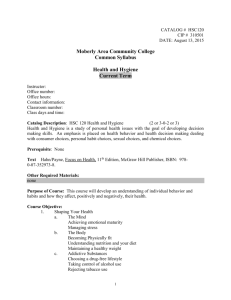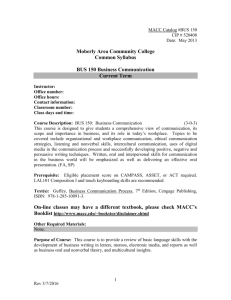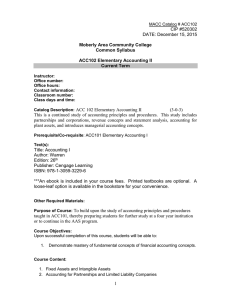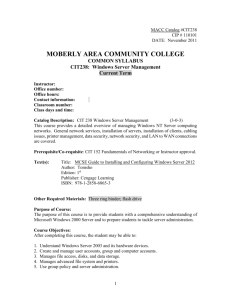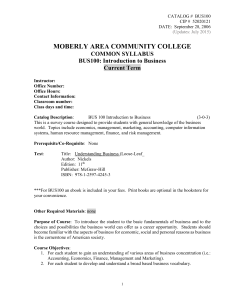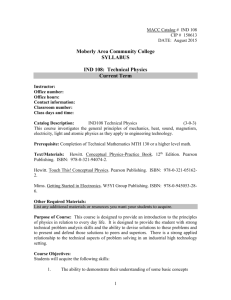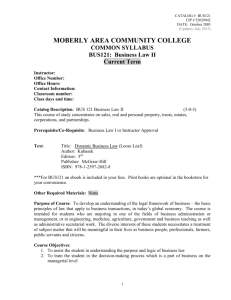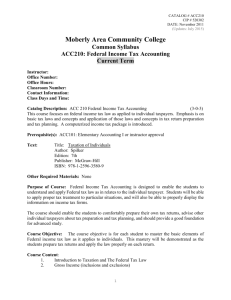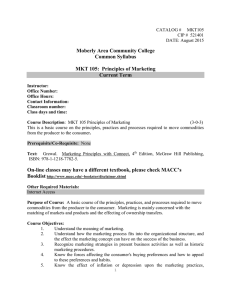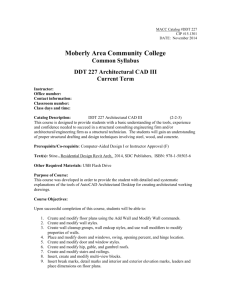IND 120 Technical Report Writing
advertisement
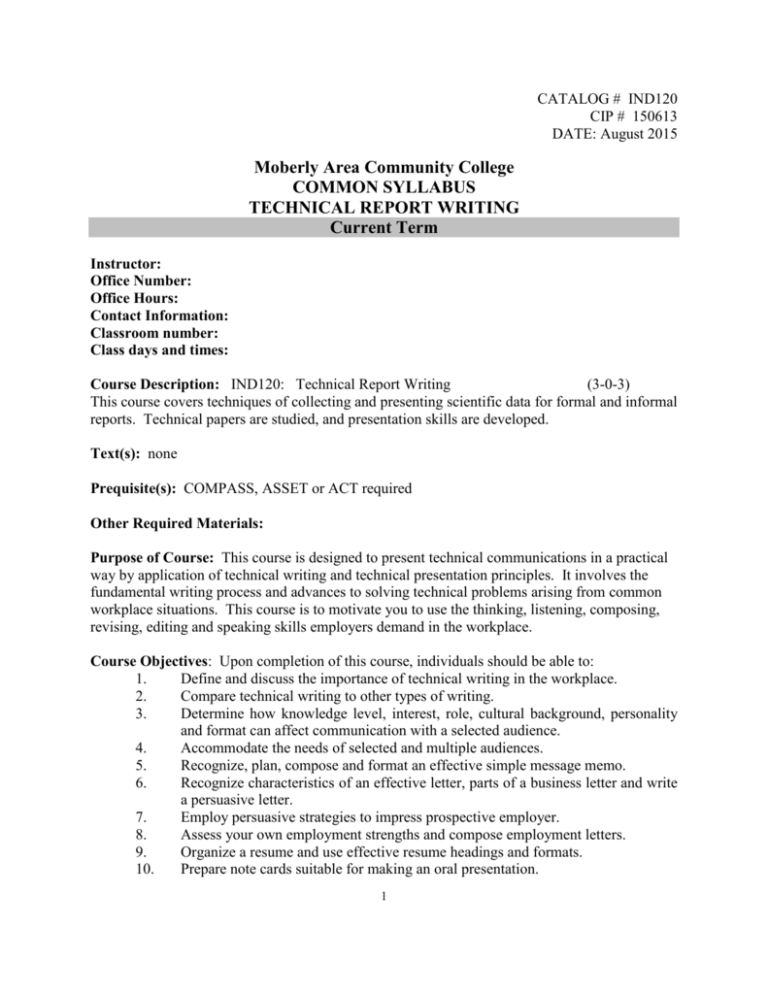
CATALOG # IND120 CIP # 150613 DATE: August 2015 Moberly Area Community College COMMON SYLLABUS TECHNICAL REPORT WRITING Current Term Instructor: Office Number: Office Hours: Contact Information: Classroom number: Class days and times: Course Description: IND120: Technical Report Writing (3-0-3) This course covers techniques of collecting and presenting scientific data for formal and informal reports. Technical papers are studied, and presentation skills are developed. Text(s): none Prequisite(s): COMPASS, ASSET or ACT required Other Required Materials: Purpose of Course: This course is designed to present technical communications in a practical way by application of technical writing and technical presentation principles. It involves the fundamental writing process and advances to solving technical problems arising from common workplace situations. This course is to motivate you to use the thinking, listening, composing, revising, editing and speaking skills employers demand in the workplace. Course Objectives: Upon completion of this course, individuals should be able to: 1. Define and discuss the importance of technical writing in the workplace. 2. Compare technical writing to other types of writing. 3. Determine how knowledge level, interest, role, cultural background, personality and format can affect communication with a selected audience. 4. Accommodate the needs of selected and multiple audiences. 5. Recognize, plan, compose and format an effective simple message memo. 6. Recognize characteristics of an effective letter, parts of a business letter and write a persuasive letter. 7. Employ persuasive strategies to impress prospective employer. 8. Assess your own employment strengths and compose employment letters. 9. Organize a resume and use effective resume headings and formats. 10. Prepare note cards suitable for making an oral presentation. 1 11. 12. 13. 14. 15. 16. 17. 18. 19. 20. 21. 22. 23. 24. Use visuals effectively in an oral report. Properly format organize and compose an effective news release. Design a document using white space, line justification, typeset test, headings, highlighters, and select visual aids appropriate to the audience’s need and the objectives of the report. Construct tables, graphs, charts and diagrams. Analyze the steps required, chose an appropriate format, words, explanations, and visual aids to write a set of instructions. Write summaries, abstracts, mechanism descriptions, trip and incident reports. Explain objectively and describe the scientific method of writing a science lab report. Format and compose progress and periodic reports. Devise criteria for evaluation and organize a recommendation report. Conduct research appropriate for the topic of a recommendation report. Determine if a problem exist and conduct preliminary research to identify factors of the problem and identify effective solutions. Collect primary data using surveys, interviews, observations and experimentation. Effectively format and organize a formal or informal proposal using data collected. Determine the characteristics of technical reading and use strategies for reading technical passages. Course Content: 1. Brief Technical Communications: memorandums, professional letters, positive and negative messages, resumes, employment communications, oral presentations, news releases. 2. Informative reports: document design, visual aids, instructions, other informative reports. 3. Analytical and persuasive reports: science lab reports, progress reports, periodic reports, recommendations reports, technical reading. 4. Researched reports: problem solving, data collection, informal proposals, formal proposals. Statement to Connect Course with Technical Program Outcome Statement: In compliance with MACC’s General Education outcomes, the student who successfully completes this course will be able to: I. Demonstrate effective written and oral communication; Assessment of Student Learning: Through student homework, grades, in-class activities and assignments, presentations and unit tests 85% of student’s grades will be determined. A comprehensive final exam will assess mastery of the course material and account for the other 15% of the student’s final grade. Quizzes Homework 5% 40% 50 points 675 points 2 Portfolio Oral Presentation Tests (3) Final Exam 10% 10% 20% 15% 100 points 100 points 300 points 100 points Description of Major Assignments/Projects: Portfolio Student portfolios will provide the students with a professional sample of business correspondence and the rules of grammar for future use. The portfolio will contain four samples of business letters, four sample business memoranda, a copy of a travel report (convention and conference report), and incident report, progress report, a periodic report and a feasibility report. The second part of the portfolio will contain ten grammar rules with sample sentences. Oral Presentation Students will give a 4 to 6 minute oral presentation to the class. The presentation will include a PowerPoint presentation that includes clip art or other inserts, animation, and transition. Students must work with other class members in teams to develop their presentation. Instructor Policies: Academic Dishonesty: MACC board policy is as follows: “Academic dishonesty by students damages institutional credibility and unfairly jeopardizes honest students; therefore, it will not be tolerated in any form.” Forms of academic dishonesty include but are not limited to the following: violations of copyright law, plagiarism, fabrication, cheating, collusion, and other academic misconduct. Incidents of dishonesty regarding assignments, examinations, classroom/laboratory activities, and/or the submission of misleading or false information to the College will be treated seriously. The procedure for handling academic dishonesty is outlined in the Student Handbook (Policy Handbook M.010). In cases of alleged academic dishonesty, the burden of proof is on the student, not on the instructor. Attendance: Any student who misses two consecutive weeks of class during a regular sixteen-week semester or the equivalent proportion of class time during a shorter session will be dropped from the class by the instructor unless acceptable justification is supplied. Additionally, any student who misses more than one-fourth of the entire number of in-seat class meetings in a regular 16-week semester or the equivalent proportion of class time during a shorter session, may be dropped from that class by the instructor if, in the opinion of the instructor, the student does not have reasonable opportunity to succeed in the class. A student’s attendance rate will be calculated based upon the first day of the semester (not the student’s date of enrollment in the course). Student attendance must be defined in a different manner for online, hybrid, and virtual courses. Student attendance in these courses is defined as active participation in the course. Online, hybrid, and virtual courses will, at a minimum, have weekly mechanisms for student participation, such as any or all of the following methods: 3 a. Completion of quizzes or exams b. Submission of assignments c. Participation in threaded discussions d. Communication with the instructor A student who does not participate in an online, hybrid, or virtual course for two consecutive weeks will be dropped by the instructor unless acceptable justification is supplied. As with ground courses, a student’s attendance rate in online courses will also be calculated based upon the first day of the semester. If a student does not demonstrate active participation in the online course within the first two weeks (or the equivalent proportion of class time during a short session), the student will be dropped as “never attended.” Simply logging into an online class does not constitute active participation. Students should be aware that their dropping a course and their last date of attendance in the course may impact their financial aid. Tardiness: Instructors policy Make-up and late work: Instructor’s policy. Extra-credit work: Instructor’s policy. ADA Statement Students who have disabilities that qualify under the Americans with Disabilities Act may register for assistance through the Office of Access and ADA Services. Students are invited to contact the Access Office to confidentially discuss disability information, academic accommodations, appropriate documentation and procedures. For more information, please call either the Moberly office at (660) 263-4100 x 11240 or the Columbia office at (573) 234-1067 x 12120, or visit our web page at http://www.macc.edu/index.php/services/access-office. Title IX Statement MACC maintains a strict policy prohibiting sexual misconduct in any form, including sexual harassment, sexual discrimination, and sexual violence. All MACC employees, including faculty members, are considered mandated reporters of sexual misconduct and as such are expected to contact the Title IX Coordinator when they become aware, in conversation or in writing, of an incident of sexual misconduct. For more information on this policy or to learn about support resources, please see http://www.macc.edu/sexual-misconduct-policy or contact Dr. Jackie Fischer, MACC’s Title IX Coordinator, at 660-263-4110, ext. 11236 or jackief@macc.edu. 4
